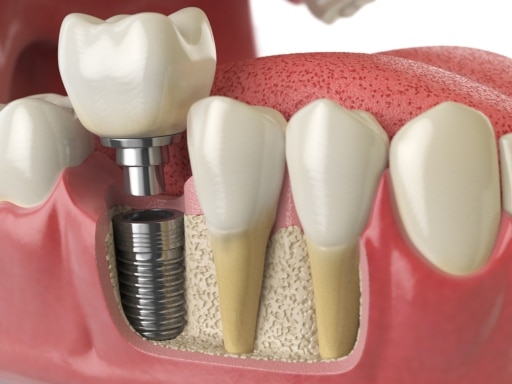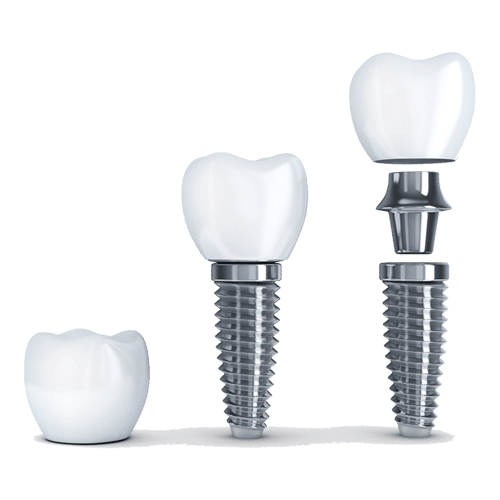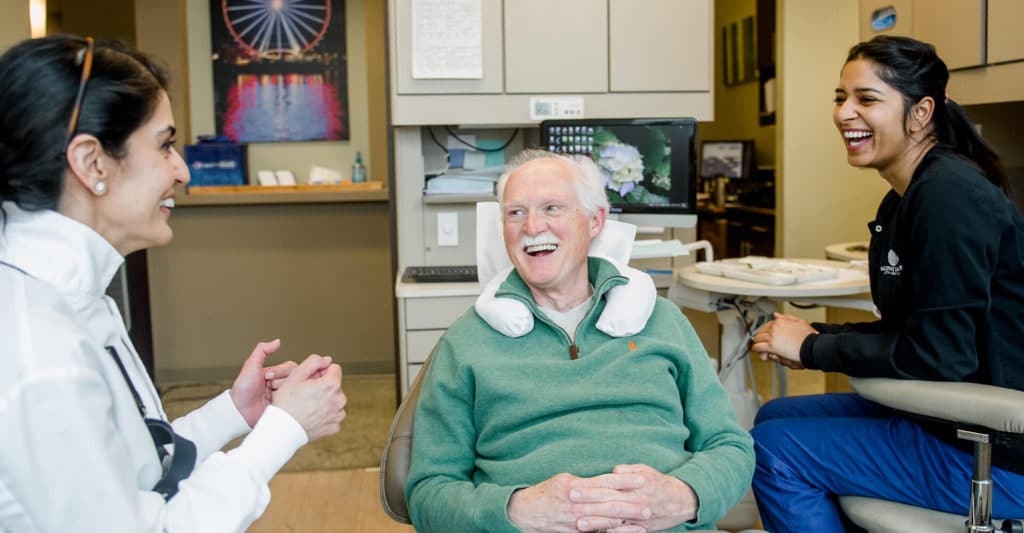The need to have teeth extracted is usually for one of two reasons; extensive decay or bone loss resulting from periodontal disease. Nearly half of our adult population struggles with periodontal disease so it is not surprising that nearly 178 million Americans are missing at least one tooth.

Here is a dental implant as compared to adjacent natural teeth.
About 40 million people have no natural teeth at all, combine that with the population that is missing a tooth and the results are a significant amount of tooth loss. It used to be that if you were missing teeth your only option for replacement was a full or partial denture or a bridge.
Thankfully, we have come a long way and that is no longer the case. Implants are usually the best option for replacing missing teeth and can be used to replace one or multiple teeth. Sometimes they are used to anchor a denture or as a part of a bridge unit. We want to share with you our top 5 reasons why dental implants are your best option!
Improved Quality of Life
Dentures don’t fit. Most people who get dentures are rarely happy with them. It is very difficult for dentures to fit well and they often slide around or click. Some have to use an adhesive every day to keep them in place.
Dentures are also difficult to implement into everyday use, especially when you’re used to natural teeth it makes it hard to adapt. Implants maintain bone health and integrity. When a tooth is extracted, over time the bone in that area will deteriorate.
Having an implant in its place means you are able to conserve the bone, which is great for the surrounding teeth and will aid in preventing facial collapse. As you can imagine when bone or teeth are lost it becomes more difficult to speak naturally and to chew food. Implants prevent this from ever being an issue.
Built to Last
Most restorations, even dentures, aren’t made to last forever. Dentures will need to be adjusted or replaced as your bone dwindles over the years. A bridge could last 5-10 years, but an implant can withstand a lifetime.
Implants have been around much longer than most people realize and carry a 30-year survival rate that is over 90% successful! If properly placed, the success of implants is nearly 98% which is about as close as you can get to a guarantee in the medical field.

Preserve Remaining Teeth
We previously mentioned that placing an implant maintains bone integrity and density, resulting in a low impact on the surrounding teeth. A bridge will use 2 teeth to fill a missing space so if anything happens to either of the natural teeth, the entire bridge has to be taken out.
A partial denture will use remaining teeth for support, which can cause gingival issues and places inappropriate force on the natural teeth. An implant will support itself without adding stress to surrounding teeth.
Looks Natural
When done properly, an implant is not noticeable from other teeth. It may look similar to a crown, but most people won’t even realize it. It will look natural to others and feel natural to you and doesn’t run the risk of staining!
Once a crown is placed and your implant is complete, you won’t even think about it being different from your other teeth. It will feel as comfortable as having your own tooth back.
No Decay
Implants are made out of titanium, meaning they are resistant to decay. Once an implant is placed, if cared for properly, you should never have to worry about it needing future treatment.
These implants can still suffer from peri-implantitis, the implant version of periodontal disease or recession, which is why it is so it is important to maintain optimal home care habits.
When using regular floss, they will need to be treated slightly different due to their shape, this will be discussed with your dentist after the implant is complete. If you’re using a water flosser there is no change to your routine.

Implants are the Absolute Best Option
Our doctors have placed many implants over their careers and implants are the absolute best option for replacing missing teeth. Whether you are a candidate for implants or not depends on your existing bone structure and how much space is available.
At Innovative Dentistry at SLU, we usually refer our patients to get a CBCT scan to view exact bone level and make sure the placement is as accurate as possible.
Once the CBCT scan has been taken, we will have the information needed to determine if an implant is right for you. If you’re interested in replacing missing teeth, let’s discuss it at your next visit, or give us a call to schedule!
References
American College of Prosthodontists: https://www.prosthodontics.org/assets/1/7/ACP_Talking_points_for_Missing_Teeth_1-12-15.pdf
Ritter Implants:
https://www.ritterimplants.com/blog/top-10-reasons-choose-dental-implants
American Academy of Implant Dentistry:
https://www.aaid-implant.org/dental-implants/who-can-benefit/
UIC College of Dentistry:
https://dentistry.uic.edu/patients/dental-implants-benefits

